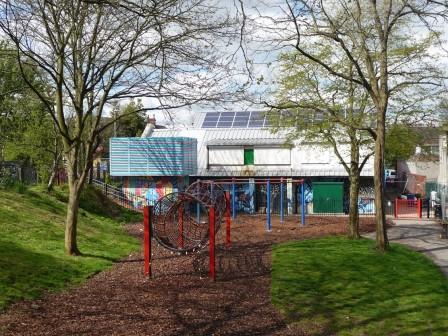Owen Square Community Energy Project
The Owen Square Community Energy Project at the Easton Community Centre demonstrates the decarbonisation of heating and the electrification of heating in a district energy scheme that side steps the need for a heavily insulated pipe network.
The CHOICES Energy Centre:
- shifts electric consumption from times of peak winter demand to times of surplus summer solar generation
- exploits Borehole Thermal Energy Storage to store heat from summer to winter
- transfers heat into buildings in winter without using combustion – without emitting any pollution or gases on site
- packages existing commercially ready technologies in a novel use combination
- and has the potential to scale up rapidly.
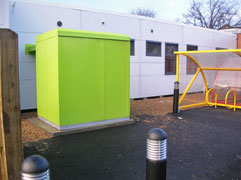
Decarbonising Heat
The problem answered in this DECC funded project is how to decarbonise heat – currently 80% of UK buildings are heated by gas. One approach is to use CHP (combined heat and power), but when fueled by gas the carbon reduction potential is limited to around 30% and the long term supply issues remain unsolved. When fueled with biomass then CHP is associated with supply chain complexity, high operational costs and environmental impact from transport and smoke emissions.
CHOICES: Community Heat Optimisation with Intelligent Control of Energy Storage
The aim of the CHOICES project is to demonstrate decarbonisation of heating by employing an innovative solar district heating network with seasonal thermal storage in the heart of a suburban neighbourhood. The project combines pioneering interseasonal heat storage technology from ICAX, energy-vector research from the University of Bath, CEPRO’s experience in energy metering, monitoring, engagement and billing at the local community level and full life cycle assessment by energy consultancy, Eunomia. The team has worked closely with Easton Community Centre and Easton Energy Group at the Owen Square site in Bristol.
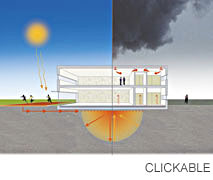
Heat networks demonstration on site
The SBRI funded CHOICES Project is a small-scale, modular Energy Center that uses air source energy on hot sunny summer days matched to surplus solar PV on the local low voltage feeder to charge an interseasonal borehole thermal energy storage (BTES) array with heat. Active replenishment of the borehole array enables it to serve many more properties, improving cost efficiency and reducing overall emissions.
Interseasonal thermal borehole storage is a relatively new technology, one that supports fully decarbonised heat energy pathways via the introduction of renewables such as photovoltaic-driven air source heat pumps, very low maintenance and minimal local environmental impact.
The CHOICES project demonstrates a system prototype operating in a suburban environment in Bristol. The CHOICES Energy Centre supplies heat to two community buildings with a third community building plus ten domestic homes to follow in the subsequent phase. Owen Park, a community green space in Bristol, was identified as ideal for the CHOICES project.
Community-scale district heating networks are normally powered by combined heat and power (CHP) plants. When fueled by natural gas these plants have limited carbon reduction potential and suffer long-term security of supply challenges. When fueled with sustainable biomass then CHP is associated with supply chain complexity and environmental impact from transport and urban air pollution.
The CHOICES project integrates a number of renewable technologies with a control system that makes choices between alternative sources of heat generation, storage and supply. These choices will depending on the energy options available at different times of day and different seasons of the year and the heat demand from different buildings at different times.
Energy performance
Compared with business-as-usual mains gas heat generation in individual buildings (with 85% efficient boilers) the project will have a carbon reduction from 67 tonnes/year with mains gas to worst case 58 tonnes/year with CHOICES (assuming 0% local PV) or typical case 29 tonnes/year (assuming 50% local PV).
Cost efficiency
Active replenishment of the thermalbank in the ground with heat throughout the summer increases ground temperatures. During the heating season, the ground source heat pumps will begin to deliver heat with a ground temperature of 25°C, instead of the baseline 10°C, significantly boosting the efficiency of the ground source heat pump and transforming the economic case for low carbon district heat at this scale. The nature of this transformation is to make the CHOICES energy center directly cost competitive with mains gas at a scale of only 280MWh/year heat demand (ten homes and three community buildings).
Reduced complexity
The CHOICES Energy Center has fewer moving parts and considerably lower maintenance than a biomass CHP plant. ASHPs, GSHPs and solar PV are all well understood standardised technologies.
The CHOICES project integrates a number of renewable technologies with a control system that makes choices between alternative sources of heat generation, storage and supply. These choices will depend on the energy options available at different times of day and different seasons of the year and the heat demand from different buildings at different times.
The CHOICES proposal exploits commercially ready technologies in a novel combination and integrates them with a low temperature heat network. In particular, the use of excess summertime PV electricity to power an air source heat pump to transfer heat to the thermal store for recovery in winter provides for multiple system efficiencies: PV output is optimised. Heat pump efficiencies are optimised (by charging the borehole field with heat in summer). Air source heat pumps run on green electricity which may otherwise cause power quality issues on the local feeder or even reverse flows onto the Medium Voltage network.
Life Cycle Analysis
A full Life Cycle Analysis has been conducted by Eunomia to quantify the cost and benefits of the CHOICES implementation at Owen Square. The CHOICES Energy Centre is expected to achieve energy savings of up to 64% and annual carbon savings of 38%, increasing to 51% carbon savings against gas by year 10 and 66% by year 20.
CHOICES is adopting a commercially driven, customer focused approach to the delivery of decarbonised heat. The focus of the technology development is to make metered heat financially attractive while facilitating ease of adoption and minimising disruption to customers.
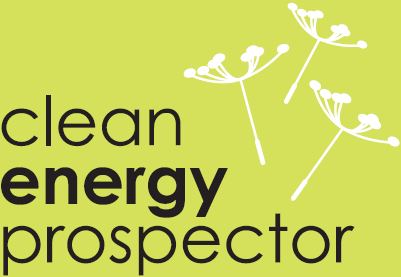


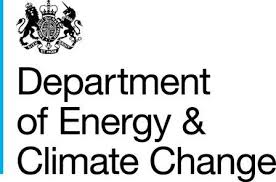
See Low Carbon Heating See Low Carbon Cooling See Ground Source Energy

